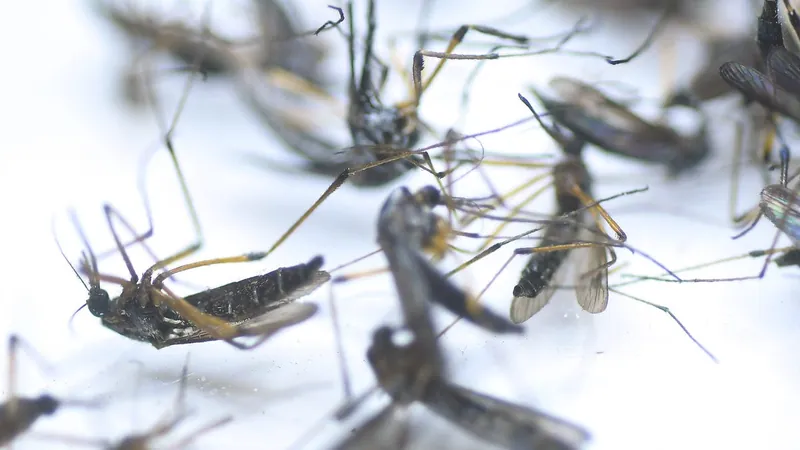
California on High Alert: Unprecedented Surge of Dengue Fever Cases Raises Concerns
2024-10-03
Author: Ting
Health officials in Los Angeles are sounding the alarm as another case of mosquito-borne dengue fever has been confirmed, bringing this year’s total to four cases in the area.
The latest patient, identified in Panorama City, did not travel to regions where dengue is typically prevalent, highlighting the gravity of local transmission.
The dengue cases reported since the fall of 2023 are alarming: one in Long Beach, another in Pasadena, followed by a series of cases in Baldwin Park, indicating a growing issue that has health authorities on edge. Dr. Muntu Davis, the Health Officer for Los Angeles County, described the current situation as “unprecedented” and emphasized the importance of preventing mosquito bites and breeding grounds.
To combat the spread of the illness, health officials recommend using insect repellent, eliminating standing water around homes, and ensuring screens on doors and windows are intact to keep mosquitoes out.
Dr. Davis urges residents to take proactive measures to safeguard themselves and their communities.
What’s Behind the Surge in Cases?
The uptick in dengue cases isn’t confined to Los Angeles alone; global statistics reflect a rising trend in dengue infections.
The Los Angeles County Department of Public Health pointed out that the Aedes mosquito species, known to transmit dengue, has been on the rise since first being identified in the county in 2011.
Unfortunately, these mosquitoes have proliferated across nearly all cities in the region.
A key driver of this worrying trend is climate change.
Rising temperatures have created more favorable conditions for Aedes mosquitoes, increasing their population and altering their behavior, including how quickly they reproduce and the speed at which they can transmit the virus.
Understanding Dengue Fever
Dengue fever is typically found in tropical and subtropical areas, resulting in severe flu-like symptoms such as high fever, headache, joint and muscle pain, and even rash or mild bleeding.
It is transmitted exclusively via mosquito bites and is not contagious between humans.
There are four types of dengue viruses, and while recovering from one type grants immunity to that strain, infection with a different type can lead to severe forms of the disease, including shock and organ failure.
There’s currently no specific treatment for dengue, but supportive care is essential to manage symptoms.
While a vaccination for dengue is available in high-risk areas of the United States, it isn’t universally recommended.
Precautionary Measures to Take
The Los Angeles County Department of Public Health has outlined effective strategies to reduce the risk of dengue:
- Use EPA-registered repellents containing DEET or other proven ingredients.
- Wear long-sleeved clothing and long pants when outdoors.
- Ensure that all doors and windows have tight-fitting screens.
- Regularly empty and clean all containers that can hold water, such as flower pots, birdbaths, and buckets.
- Cover water storage containers to prevent mosquitoes from breeding inside.
Health authorities are actively engaging with communities to spread awareness and implement control measures, including increasing mosquito trapping efforts to further reduce risks.
Remain Informed and Vigilant
As vigilance against dengue fever intensifies in Los Angeles, residents are encouraged to seek advice from local clinics or call the Public Health InfoLine for any queries related to dengue fever.
It is crucial to stay informed and take preventative actions to protect both yourself and the broader community from the resurgence of this mosquito-borne disease.
Stay tuned for more updates as Los Angeles combats this public health challenge!



 Brasil (PT)
Brasil (PT)
 Canada (EN)
Canada (EN)
 Chile (ES)
Chile (ES)
 España (ES)
España (ES)
 France (FR)
France (FR)
 Hong Kong (EN)
Hong Kong (EN)
 Italia (IT)
Italia (IT)
 日本 (JA)
日本 (JA)
 Magyarország (HU)
Magyarország (HU)
 Norge (NO)
Norge (NO)
 Polska (PL)
Polska (PL)
 Schweiz (DE)
Schweiz (DE)
 Singapore (EN)
Singapore (EN)
 Sverige (SV)
Sverige (SV)
 Suomi (FI)
Suomi (FI)
 Türkiye (TR)
Türkiye (TR)